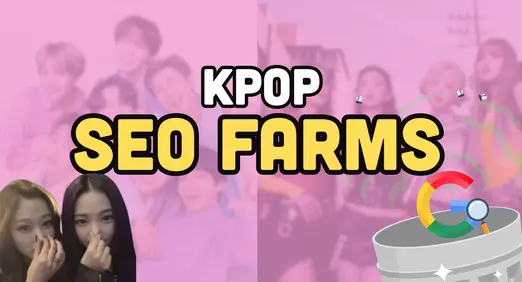Weird how so many of these slop blogs that just copy paste profiles from other sites are calling themselves databases these days @kpopppost do you know why that is? @searchliaison pic.twitter.com/1Br2TDVvPC
— kpopping (@kpoppingcom) June 23, 2025
The problem isn’t that quality articles don’t exist. They do. It’s that Google’s ranking system rewards whoever knows how to work Search Engine Optimization (SEO). If a site nails the right keywords, drops a catchy headline, and uploads fast when news breaks, it can outrank a more original, better-written piece.
SEO comes down to three things: how your site is built, how you use keywords on the page, and how many other sites link to you. In kpop coverage, that often means cranking out short, fast posts that look good to the algorithm but don’t give fans much beyond what they already know.
.jpeg?v=eab61)
Clickbait Works and Google Does Not Judge Accuracy
In Kpop news, speed consistently wins over substance. Some sites post within minutes using targeted keywords, capturing the first wave of traffic. By the time a thoughtful article is ready, the biggest surge of clicks has passed.
Headlines promising shocking revelations or dramatic twists tend to outperform balanced reporting. Google’s algorithm measures user interaction rather than journalistic accuracy. If enough people click, the system ranks it as relevant, even if it repeats information from elsewhere.
Google’s lyric translation for BTS Suga’s Daechwita includes the N-word.
Full story here:https://t.co/VBaKPVbonI
— kpopping (@kpoppingcom) June 16, 2025
Even kpopping writers admit they sometimes follow the same formula just to compete with the said outlets. The result is a search page filled with near-identical headlines and very little original reporting. Fans who want deeper insights, rare interviews, or cultural context usually have to dig past the first few pages. Casual readers rarely do that, so high-quality work ends up overlooked.
How to Find Better Kpop Content
Fans who want more variety can try filtering results by date, adding keywords like “interview” or “feature,” or going straight to trusted independent sites. Until Google changes how it weighs speed, popularity, and depth, the fastest and most optimized posts will keep dominating search results.
The KPOP industry has always been known for its emphasis on youth, talent, and high-energy performances. However, a pressing question has sparked intense debate among fans and experts alike: are idols debuting too young?https://t.co/Dop2PmyxSy
— kpopping (@kpoppingcom) June 3, 2025
Kpop has endless stories to tell, but Google often highlights only the fastest and most search-friendly posts. Unless ranking systems start rewarding substance alongside timing, fans will keep seeing the same headlines while high-quality kpop journalism remains buried.
